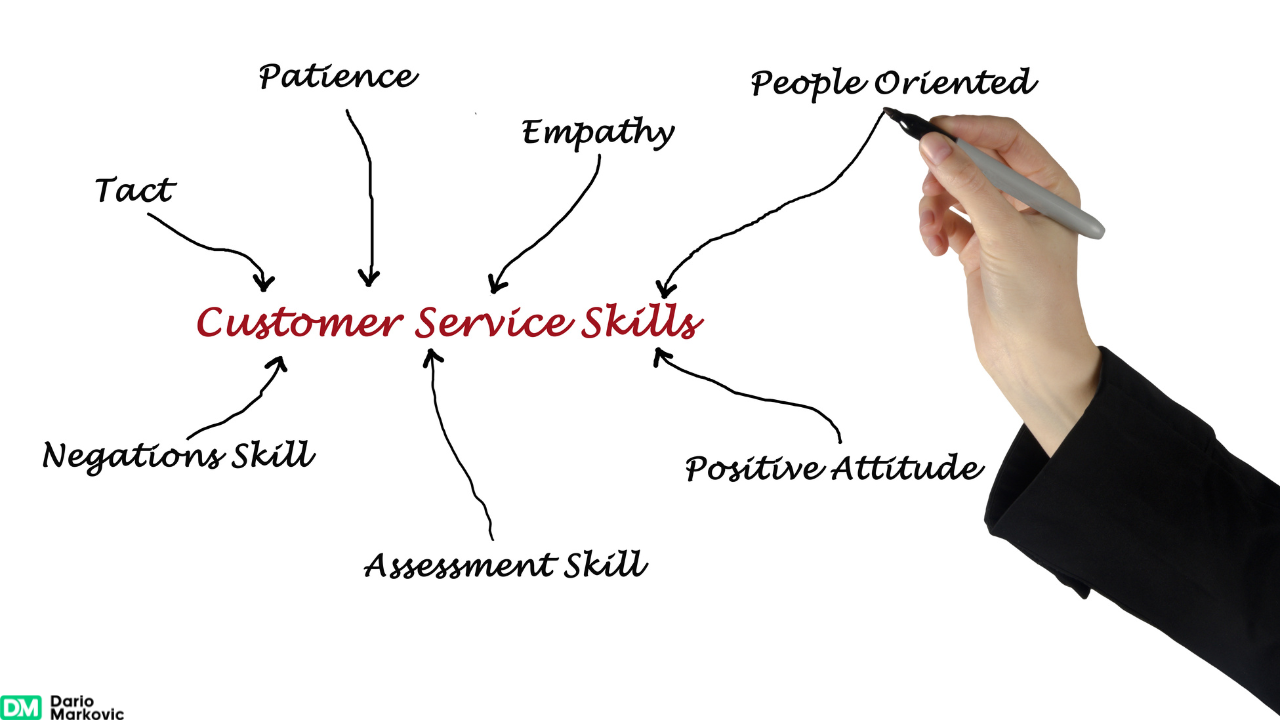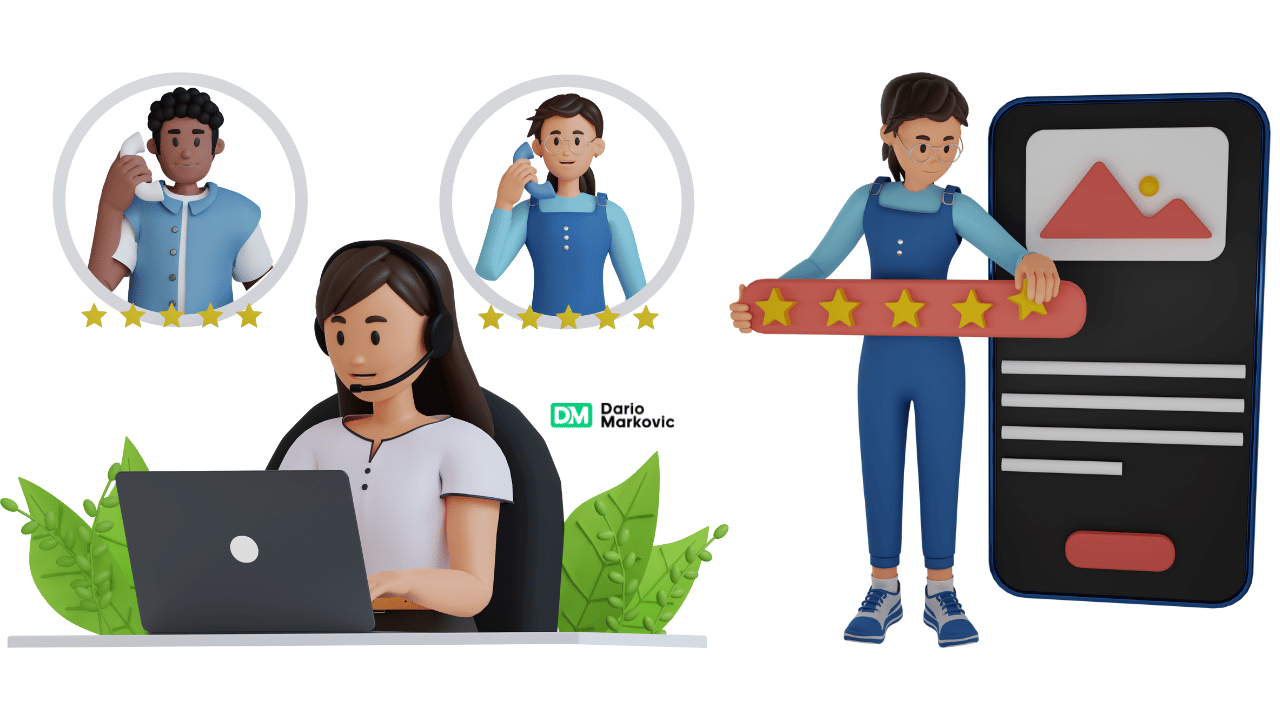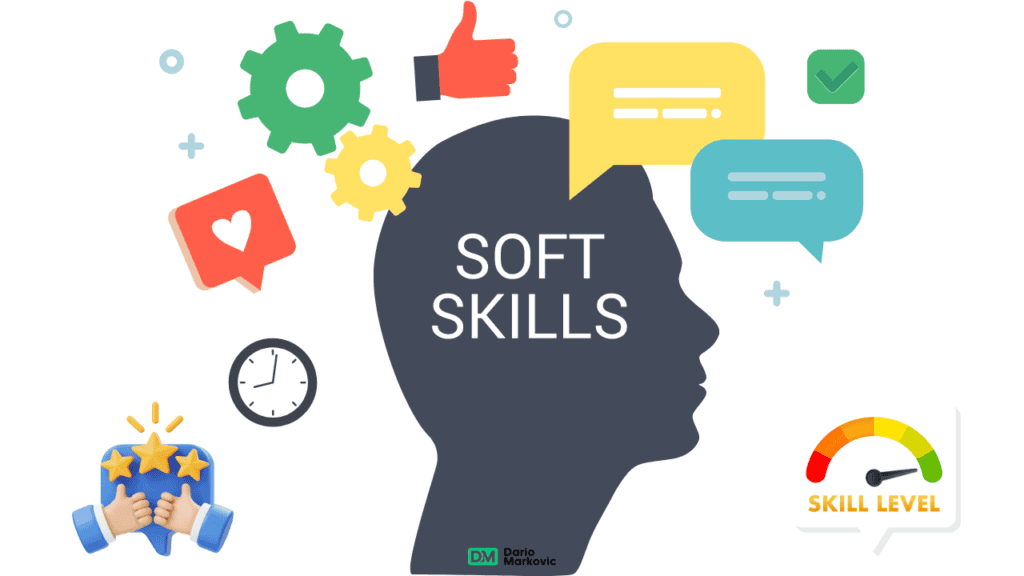This customer service skills list is your roadmap to providing outstanding service in 2024. We strip down to the essentials and offer direct insights into the skills that matter most–from empathy to adaptability–preparing you to exceed customer expectations in an evolving market.
Key Takeaways
- Active listening, empathy, clear communication, product knowledge, problem-solving, adaptability, and conflict resolution are key skills for exceptional customer service in 2024.
- Customer service professionals need continuous learning, feedback, and awareness of industry trends to enhance and maintain their service skills and adapt to changing customer expectations.
- Advanced customer service skills such as persuasive sales techniques, positive language, and tone are crucial in improving customer retention and satisfaction.
Mastering the Art of Customer Service: Top Skills for 2024

Good customer service remains a pivotal element of any thriving business enterprise. Yet, the competencies required to deliver good customer contacts have been constantly evolving.
As we enter 2024, an array of vital skills has emerged as essential for any customer service professional.
These abilities extend beyond mere interactions with patrons. They encompass crafting memorable experiences that nurture satisfaction and foster brand loyalty.
In the following discussion, we will delve into these proficiencies to gain deeper insight into their importance for refining the art of customer service.
Active Listening and Empathy
Engaging in active listening means fully immersing oneself in the communication process with a customer, grasping both their spoken message and the feelings and intentions underlying it.
This shows customers that they are heard and appreciated, which is crucial for them to feel valued. Active listening demands the listener’s attention.
- Full attention
- Strong focus
- Enduring patience
- An unbiased stance
The cornerstone of delivering excellent customer service is ensuring every client feels deeply understood and their issues thoroughly recognized.
To this end, our team commits itself unwaveringly to offering consistently nothing less than stellar customer service to those same individuals.
Empathy involves perceiving and sharing the emotions of others while keeping one’s own emotions in check.
Establishing an emotional rapport through empathy can foster trust between a customer service representative and a client. Consider when customers face complex difficulties.
Employing active listening tactics to grasp their distress and empathizing with them genuinely allows representatives to devise satisfying resolutions effectively. This strategy paves the way for nurturing lasting connections with clients.
Effective Communication
Effective communication with customers forms the backbone of great customer service. It’s not just about speaking clearly but also understanding customer inquiries and working with teammates to resolve issues.
Clear and concise communication leads to better understanding and resolution of customer issues, thus satisfying customer expectations promptly.
Consider a scenario where a customer has a complaint. Clear communication is key to resolving the issue effectively.
It involves prioritizing tasks based on urgency and impact and continuously improving to stay organized. Without effective communication, even the simplest issues can lead to customer dissatisfaction, emphasizing the importance of this skill.
Product and Service Expertise
Knowledge of products and services is fundamental for customer service representatives to answer customer questions efficiently, troubleshoot issues, and guide customers accurately.
Imagine a customer calling in with a technical issue. A customer service rep with in-depth product knowledge can quickly identify the problem and provide a solution, saving time for both the customer and the company.
Moreover, this knowledge enables customer service agents to:
- Offer relevant recommendations to customers, adding value to their experience
- Resolve issues effectively
- Contribute to customer satisfaction and loyalty, which in turn can improve customer satisfaction scores.
Regular product training and updates are essential for maintaining and enhancing this knowledge. Thus, product and service expertise helps resolve issues and contributes to customer satisfaction and loyalty.
Building a Strong Customer Service Foundation: Key Skills

Laying the groundwork for exceptional customer service extends beyond having basic service skills and includes sharpening essential capabilities such as:
- problem-solving
- critical thinking
- time management
- organization
Good customer service skills enable representatives to navigate a myriad of circumstances, whether resolving intricate problems presented by customers or juggling demanding tasks.
We will examine these specific abilities to understand their importance in forming a solid foundation for delivering excellent customer service.
Problem Solving and Critical Thinking
A customer service professional’s ability to think critically and solve problems is indispensable. These skills facilitate the prompt resolution of customers’ concerns by allowing representatives to:
- Delve into customer issues analytically
- Assess potential resolutions carefully
- Decide on an approach grounded in logical evaluation rather than guesses or insufficient data.
When confronted with a client problem that falls outside what is documented in the service manual, the representative must apply critical thinking to scrutinize the issue at hand and draw upon their problem-solving prowess to craft an appropriate response.
It’s crucial for those in customer support roles to continuously update themselves on cutting-edge tools and technologies relevant to servicing clients effectively so they can employ them adeptly when resolving various challenges.
Time Management and Organization
Efficient time management and organization are vital for customer service teams to provide timely responses and minimize customer communication delays. Imagine a situation where a customer service rep must juggle multiple inquiries simultaneously.
Without proper time management and organizational skills, the customer service rep might get overwhelmed, leading to poor service delivery.
Enhancing organizational skills involves categorizing complaints, adopting standardized procedures, and implementing a systematic follow-up approach to deal with customer issues methodically.
Customer service teams can manage their workload better and remain organized by utilizing a knowledge base for common queries and automating routine tasks.
Adaptability and Flexibility
In the dynamic realm of customer service, being adaptable and flexible is crucial to the customer service skills list. These qualities equip customer service agents with the ability to:
- Tailor their interaction style in response to customers’ requirements and evolving situations
- Engage in interactions without rigid anticipations
- Switch gears when needed to provide optimal support
Possessing adaptability is an essential characteristic for customer service agents as it facilitates prompt reaction and instant modifications amidst fluctuating conditions.
When agents exhibit flexibility, they are more adept at engaging with a diverse clientele that spans different cultures and backgrounds, guaranteeing a favorable experience for each customer.
Enhancing Customer Experience with Advanced Skills

Mastering advanced skills such as conflict resolution, persuasion, and employing positive language is crucial for augmenting the customer experience beyond the foundational aspects of an excellent strong customer service department.
We shall delve into these competencies to understand how they significantly improve customer interactions.
Conflict Resolution
Disagreements are a natural part of any customer service encounter, but the approach that the representative takes when dealing with conflict can have a profound impact on how customers view their interaction and form opinions about the company.
By employing effective strategies for resolving conflicts, there is an opportunity to turn potentially negative situations into experiences reinforcing customer loyalty.
Take, for instance, a situation where a product fails to meet customer expectations, and they request their money back.
If handled skillfully by someone proficient in managing disputes, this dissatisfied individual’s frustrations can be soothed without necessarily providing an immediate solution.
Strategic resolution tactics applied consistently across multiple incidents manage these events effectively and play a pivotal role in enhancing overall customer satisfaction levels.
Persuasion and Salesmanship
The art of persuasion is a vital component in customer service, often intertwined with sales techniques. Effective persuasive abilities empower representatives to assure potential clients that a product is appropriate for their needs, thereby promoting both sales and sustained patronage.
Consider an instance where a customer hesitates to make a purchase. Adeptness in persuasion enables the customer service rep to accomplish several key actions.
- Efficaciously outline how the advantages of the product resonate with what the customer seeks
- Alleviate any reservations or counterpoints that arise from the consumer
- Present supplementary data or confirmation reinforcing why the merchandise is worthy
- Suggest inducements or markdowns as an enticement for finalizing the acquisition
In harnessing these skills, all customer service team members involved in client interactions—including those handling many customer service inquiries—have an opportunity to transform numerous instances involving prospective very same customers into successful transactions, thus enriching overall engagement experiences.
Proficiency in persuading clientele escalates transaction numbers, and fosters deepened allegiance from consumers.
Customers who are persuaded about benefits offered by products or services become more inclined towards ongoing support, which significantly aids in maintaining a robust base for repeat business engagements.
Positive Language and Tone
The choice of words and the demeanor of customer service representatives play a significant role in shaping how customers perceive their experience.
When confronted with challenging scenarios such as explaining product shortages or dealing with problems, deploying positive language can lead to more favorable impressions and enhance overall customer satisfaction.
Creating an inviting environment through courteousness and warmth influences the customer’s willingness to engage positively.
For instance, consider a scenario where tension is high due to client irritation. Here, if the customer service agent remains optimistic, they can transform that frustration into a more fruitful and pleasant exchange.
Developing and Maintaining Exceptional Customer Service Skills
Let us now delve into the essential process of developing and honing customer service skills that are crucial for outstanding performance.
Engaging in ongoing education, actively seeking feedback, and remaining abreast of current trends within the industry is vital.
We will thoroughly examine each of these elements as we proceed. This approach ensures that one’s service skills meet and exceed the expectations set within this dynamic field.
Continuous Learning and Improvement
In the dynamic customer service arena, customer service professionals must engage in ongoing education.
This hones their capabilities and ensures they remain adept across many situations.
Specifically, training in communication plays an integral role by enabling customer service reps to sustain efficient communications with clients under diverse circumstances.
The use of simulated exchanges via mock scenario exercises proves beneficial for sharpening representatives’ service skills within a manageable setting.
Promoting critical thinking creates a culture where learning from mistakes is standard practice, leading to continual quality improvement.
Seeking Feedback and Implementing Changes
Feedback is a critical tool for refining customer service skills. It enables the identification of areas that need enhancement and guides subsequent modifications.
Paying close attention to customer feedback—even when it’s not explicitly expressed—can lead to improvements in service delivery methods.
Consider a situation where customers consistently encounter a specific problem. By carefully examining their feedback, one can pinpoint and rectify the underlying cause of this persistent issue, providing advantages for both clients and the business.
Consequently, actively pursuing feedback and making adjustments can elevate the caliber of overall customer service performance.
Staying Up-to-Date with Industry Trends
Keeping up with the latest industry trends is crucial for customer service reps, as it allows them to harness new technologies and embrace best practices effectively.
The ever-changing customer service landscape demands adaptability, especially when dealing with seasonal fluctuations, shifts in technology, varying remote work scenarios, or unforeseen business challenges.
By being well-versed in contemporary trends and methodologies, customer service professionals can respond to customer questions accurately while providing knowledgeable support that aligns with recent developments.
This commitment not only streamlines issue resolution but also elevates the overall quality of the customer service experience provided.
Dario’s Summary
In this blog entry, we’ve extensively explored key customer service skills projected for 2024 and the strategies to cultivate and sustain them.
Our exploration does not conclude here. Aufgrund of the ever-changing character of customer service, ongoing education, and flexibility is indispensable.
These competencies will act as a navigational aid as we venture through the shifting terrains of customer support, steering us toward forging enduring impressions on customers and establishing robust connections with them.
Frequently Asked Questions
What are the 7 skills of good customer service?
Seven vital abilities for delivering good customer service include adept problem solving, effective communication, understanding empathy, savvy business acumen, in-depth knowledge of the product or service, proficient time and customer service management skills, and a congenial attitude.
Possessing these competencies is fundamental to providing excellent customer service.
What are the 3 important qualities of customer service?
Providing excellent customer service hinges on three critical attributes: maintaining professionalism, exercising patience, and prioritizing a “people-first” approach. Adherence to these principles ensures the delivery of outstanding service.
What are the top customer service skills in 2024?
In 2024, exceptional customer experiences hinge on possessing key service skills such as active listening, empathetic interaction, proficient communication, in-depth knowledge of products and services, adept problem-solving abilities, acute critical thinking prowess, and efficient time management strategies.
Thorough organizational capabilities and a strong capacity for adaptability and flexibility. These top customer service skills are indispensable for excellent performance in the field.
How can I improve my problem-solving skills in customer service?
Keeping up-to-date with the most recent tools and technologies can enhance your abilities in problem-solving within customer service. Use critical thinking to assess circumstances thoroughly and proceed with reasoned and well-founded decisions.
By adopting this approach, you’ll become more adept at efficiently resolving issues presented by customers.
How can feedback help improve the customer service skills listed?
Paying close attention to what customers have to say and making adjustments accordingly can improve the quality of customer service.
Acting on feedback is crucial for pinpointing opportunities to improve your service skills in dealing with customers.



